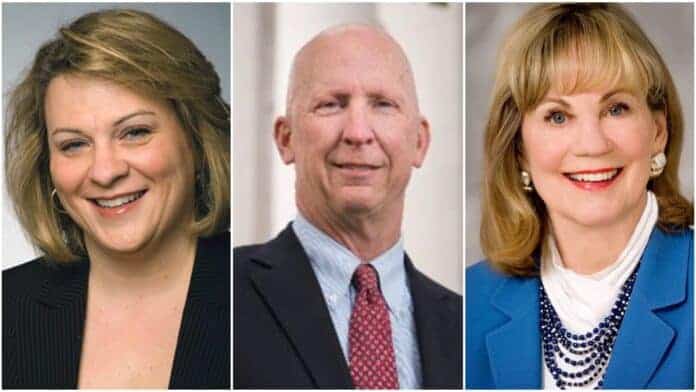“This has nothing to do with making it more difficult for people to vote,” , “It only has to do with third-party money coming into Wisconsin.” – Rep. Janel Brandtjen
On Wednesday, Wisconsin lawmakers worked at the Capitol to close the gaps from last November’s election.
The Wisconsin Senate approved four pieces of Wisconsin election integrity legislation that Sen. Duey Strobel, R-Saukville, said will make it easier to vote and more difficult to cheat in Wisconsin.
One of the plans, which provides more protections for poll workers, is from Sen. Alberta Darling, R-River Hills.
“We must restore confidence and trust in our elections, and these bills are the first step in doing that,” Stroebel said.
Wisconsin Election Integrity Legislation
- SB 213 expands enforcement options for election law violations by giving the courts a direct path in election challenges, not just the Wisconsin Election Commission. The plan also allows prosecutors in neighboring counties to investigate election complaints in adjacent counties.
- SB 208 increases transparency at the Wisconsin Elections Commission by requiring the online publication of the Commission’s meeting minutes.
- SB 207 clarifies the rules in Wisconsin dealing with outside money and its use in the state’s election administration.
The last plan, dealing with out-of-state money for nonprofits, is also the focus in the Wisconsin Assembly.
The others are all Stroebel’s, including:
“You’re talking about millions of dollars with no regulations and no reporting,” Brandtjen said. “And this is just the money we know about.”
Rep. Janel Brandtjen, R-Menomonee Falls, told The Center Square on Wednesday that she is poised to push for a number of new restrictions on how groups like the Mark Zuckerberg-funded Center for Tech and Civic Life can operate in the state.
Brandtjen said the investigation is solely about Wisconsin election integrity, not about who won the November election in Wisconsin.
Brandtjen is leading the investigation in the Assembly inspired by reports that the CTCL all but took over Green Bay’s election operation last fall. Brandtjen said that investigation is now focusing on other communities in the state because of a lawsuit filed last week.
Most of the Senate’s election proposals, and just about anything that comes from Brandtjen’s investigation, is almost certainly dead on arrival at Gov. Tony Evers’ office.
“If this was the Tea Party funded by the Koch brothers, we still wouldn’t want third party money coming into Wisconsin and into our elections,” Brandtjen said.
“This has nothing to do with making it more difficult for people to vote,” Brandtjen said. “It only has to do with third-party money coming into Wisconsin.”
Brandtjen said the governor has made it clear he won’t sign anything that he thinks makes it more difficult to vote.
WRN broke the story on the activities of Michael Spitzer-Rubenstein in November 2020. You can see our earlier reporting here.
We revealed then that Brown County’s elected County Clerk had expressed concern to the Wisconsin Election Commission on election day that the City of Green Bay’s Central Count process, where absentee ballots were counted, was “tainted.” The City of Green Bay has defended its election process.
Table of Contents











![WATCH: Elon Musk Town Hall Rally in Green Bay [FULL Video]](https://www.wisconsinrightnow.com/wp-content/uploads/2022/04/Elon_Musk_3018710552-356x220.jpg)



![The Wisconsin DOJ’s ‘Unlawful’ Lawman [WRN Voices] josh kaul](https://www.wisconsinrightnow.com/wp-content/uploads/2025/03/MixCollage-29-Mar-2025-08-48-PM-2468-356x220.jpg)







![Phil Gramm’s Letter to Wall Street Journal [Up Against the Wall]](https://www.wisconsinrightnow.com/wp-content/uploads/2025/03/gramm-356x220.png)










